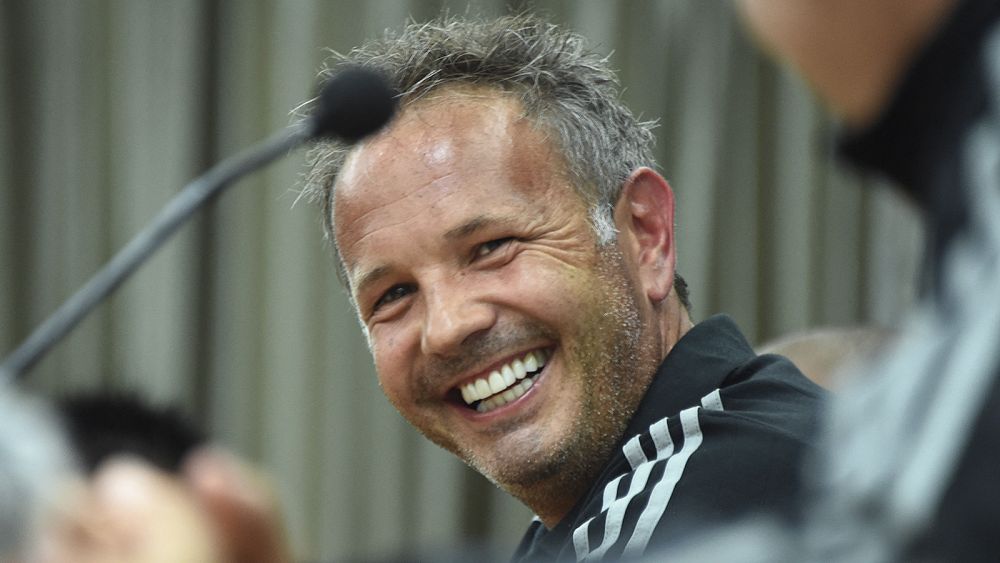
Siniša Mihajlović passed on Friday after a long battle with leukaemia, according to the family of the celebrated Yugoslav and Serbian player and manager. He was 53.
In a statement, the family said they were pained to announce the “unjust, premature death” of an “exemplary husband, father, son and brother”.
Born in Vukovar to a Croat mother and a Serb father, Miha or simply Siniša — as he was known to his fans — was a football wunderkind who earned himself a spot on the Yugoslav national team and a transfer to the country’s giants, Red Star Belgrade, by the age of 21.
The one-million-Deutschmark (€500,000) transfer in 1990 for the youngster with long chestnut brown hair and a powerful left foot made him the most expensive footballer in the country at the time.
That season, Red Star won the Champions League, with Mihajlović playing a key role — first against Bayern Munich in the semifinal, where his freekick secured the Belgrade outfit a spot in the finals, and then helping his team reach the very top of European football in the game against Olympic Marseille.
But the good times did not last too long.
Yugoslavia was already disintegrating in a series of wars that pitted the country’s ethnic groups and recently independent states against each other.
His hometown of Vukovar saw some of the worst fighting at the beginning of the war in an assault by the remnants of the Yugoslav People’s Army in August of 1991. The local Croats — who fought for their independence — and pro-Belgrade ethnic Serb forces razed the city to the ground.
The northern Croatian city has since become symbolic of the war crimes and ethnic cleansing conducted by troops backed by the Serbian hardline leader Slobodan Milošević in various parts of the former federal state between 1991 and 1999.
As the siege of Vukovar unfolded, Mihajlović moved to Italy, having been acquired by Roma earlier that summer.
Playing as a defender and midfielder, the freekick specialist earned himself a dedicated cult following wherever he applied his trade — moving from Roma to Sampdoria and then on to Lazio and Inter.
In Sampdoria, he became the darling of coach Sven Goran Eriksson, who deployed him at the centre of his defence. But it was only in Lazio, where he played from 1998 to 2004, that he rose to the very top, winning the league title as well as the Italian Cup and Supercup, among other trophies.
His 20 goals in the biancoceleste jersey were highlighted with a one-of-a-kind hattrick from freekicks against his former team, Sampdoria.
Playing for three national teams without switching allegiances — the Socialist Federative Republic of Yugoslavia, the rump Federal Republic of Yugoslavia, and Serbia and Montenegro — Mihajlović accrued 63 appearances and scored 10 goals.
After his retirement, he switched to football management, coaching the likes of Inter, Fiorentina, Sporting Lisabon and the Serbian national team until his second and final stint with Bologna in January 2019.
A life and career bookended by two different friendships
Although he mostly stayed out of politics, Mihajlović became known for his friendship with Željko Ražnatović, a Red Star ultras leader-turned-warlord and criminal underworld boss involved in a series of war crimes and in ethnic cleansing from Croatia to Bosnia and Kosovo.
Mihajlović was also vocally against the NATO intervention in Serbia and Montenegro in 1999, meant to stop the bloody crackdown by Belgrade troops against Albanians in Kosovo, which resulted in ethnic cleansing and more than one million refugees, who were forced to leave the former Serbian province.
He won the Scudetto — the Italian championship — with Lazio that year.
In his biography, Mihajlović explained that he did not want to deny he was friends with Ražnatović — who he claimed he knew from his Red Star days — because it would have been “hypocritical” to claim otherwise.
Meanwhile, he struck a friendship with another football world mainstay with Balkan roots, the Bosnian-Swedish superstar Zlatan Ibrahimović.
The duo appeared together at the San Remo music festival, and Ibrahimović stated “he would go to war” together with Mihajlović due to their closeness.
Just days after Russia began its full-scale invasion of Ukraine, Mihajlović, still at the helm of Bologna, held an emotional press conference condemning the war.
“I am sure that war cannot and must not be the only way of solving problems,” he said.
It was Mihajlović who broke the news of his leukaemia diagnosis in July 2019.
“I never play to lose, in football as well as in life. I will defeat evil,” Mihajlović said, “and I will do it for my wife, for my family, for those who love me.”
Mihajlović’s grit in battling leukaemia further endeared him to the Bologna faithful, who famously came to cheer for him beneath the windows of his hospital. Upon learning of his diagnosis, Bologna and Lazio fans even organised a pilgrimage to the Sanctuary of San Luca to pray together for his recovery.
Mihajlović was, however, sacked in September after his team accrued just three points from the first five matches of the 2022/2023 Serie A season.
“This time the taste (of me leaving) makes me sadder,” Mihajlović wrote in a statement after his firing, thanking his “brothers and fellow citizens” for “three and a half years of football, of life, of tears, of joy and of pain.”
He is survived by his spouse Arianna Rapaccioni and their six children.
